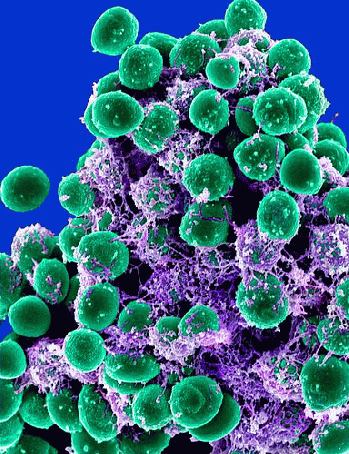apenems are the most powerful antibiotics. They are used as a last resort for many bacterial infections, such as E. coli and Klebsiella pneumoniae carbapenemase (KPC). The NDM-1 gene causes the bacterium to produce an enzyme that neutralizes the activity of these antibiotics. Aug 16, 2016, www.medicalnewstoday.com/articles/197616.php
In March 2016 I saw I saw the following FrontLine Presentation:
"A Superbug Outbreak at NIH", October 22, 2013, 12:45 pm ET by Bill Rockwood and Sarah Childress.
The following are excerpts:
The hospital creates a separate ICU for KPC patients. The old ICU is cleaned out and disinfected by robots before patients are moved back in. But somehow, it spreads beyond the ICU.
Then, a year after the outbreak, a young man arrives at NIH due to complications from a bone marrow transplant. He becomes infected with KPC and dies.
Today, the NIH knows that KPC isn't gone from the hospital. "Oh no, absolutely not," Tara Palmore, an infectious disease specialist at the NIH, told FRONTLINE. "I think that we have to be extremely vigilant in the coming years, because of the increasing rise, the increasing prevalence of KPCs in the United States."
In April 2016 someone reported that FDA was accepting comments via FDA-2014-N-2235, on a firm, OXitec (OXitec's home page, www.oxitec.com/ Oxitec), for: Investigational Use of Aedes aegypti OX513A.
This appears to be a mosquito genetically modified in hope that it will mate with female mosquitos carrying the Zika virus in Florida in order to dampen the spread of mosquitos transmitting the Zika virus.
The OXitec requests and documents and the FDA ok for the release of genetically modified mosquitos and public comments are at: https://www.regulations.gov/docketBrowser?rpp=25&so=DESC&sb=commentDueDate&po=125&dct=PS&pd=04|01|16-04|08|16&D=FDA-2014-N-2235
OXitec's home page, http://www.oxitec.com/ states, "Oxitec is a pioneer in controlling insects that spread disease and damage crops, in a way that is sustainable, environmentally friendly and cost effective."
My original letter is in the FDA -- The following are edited excerpts of my letter to FDA responding to FDA-2014-N-2235:
"It is extremely irritating and suspicious that the FDA would even consider such a proposal, when we already have Gram Negative snippets of DNA in the wild creating super bacteria such as NDM-1 and KPC which are beyond current technology to treat. [Not only do] we risk creating mosquitos that may transmit altered DNA that could affect other creatures in the wild create a zoonotic soup that might jump to the human population, where millions and millions could succumb [but we risk this at a time when denied tax dodging Pfizer in a pique has decided to close down its antibiotic lab leaving the US with no major R&D for advanced antibiotics] either by corporations or government to find solutions to these nontreatable bacteria infections."
(Note: You can view every article as one long page if you sign up as an Advocate Member, or higher).






